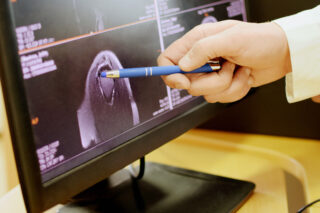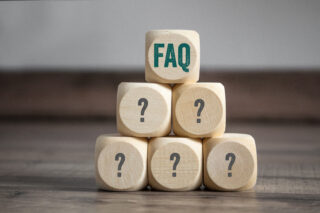Rotator cuff tear
What is the rotator cuff?
The rotator cuff is made up of four tendons (supraspinatus, infraspinatus, subscapularis and teres minor). They act to co-ordinate the elevation and rotation of the arm away from the body.
How is it injured?
They can be injured by a single traumatic injury or more commonly by repetitive trauma usually- overhead activities. As we age so do the tendons, making them more prone to injury. Injuries to the rotator cuff under the age of 35 are relatively rare. However pain from rotator cuff conditions can occur without any precipitating event.
What symptoms do you get?
Pain, this is usually felt over the outside of the shoulder and can radiate down the arm. This pain is often felt at night and it can be difficult to lie on the affected side. The pain can be aggravated by lifting the arm away from the body as can rotational movements of the affected arm.
The picture shows the typical location of pain.
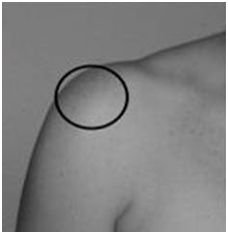
Clincal Examination
The following video shows details ofkey points for shoulder examination of rotator cuff problems
What is the treatment?
There are degrees of injury, with impingement, partial thickness tears of the tendons through to full thickness tears.
Initial treatment is usually with rest, painkillers and some physiotherapy. An injection of local anaesthetic and steroid may be employed as an initial treatment. Surgical intervention is indicated where there is a full thickness tear or where there has been a failure of conservative treatment.
Surgical Options
These are dependent on the pathology and the patient. Full thickness tears in fit patients should be treated by rotator cuff repair in order to gain the best functional outcome of the shoulder. This can be done arthroscopically (keyhole) or by open surgery. To read more about arthroscopic rotator cuff repair click here.
The video below shows an arthroscopic view of a C shaped rotator cuff tear.
The principle is to repair the tendon back to bone. The surgery acts to give a temporary fix to allow the bodies’ biological repair to reform the permanent bond from tendon to bone.
The picture show a torn rotator cuff and a repair being done.
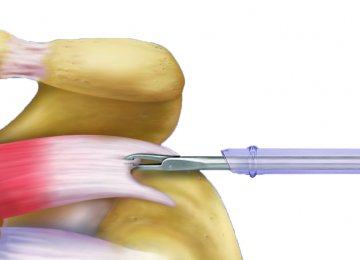
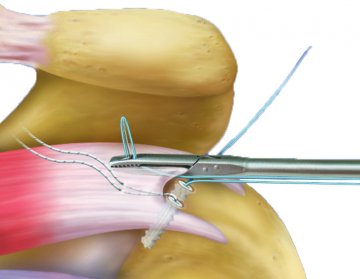 .
.
A Brooksbank

CONSULTING HOURS
CONTACT DETAILS
CONDITIONS
Treatment journey
APPOINTMENTS
Make a consultantion appointment wiith Mr Andrew Brooksbank at BMI Ross Hall Glasgow.
FAQ’s
Frequently asked questions about appointments, treatment, recovery and insurance/payments.
